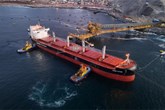Slight decline in freight throughput Port of Rotterdam in 1Q23
In 1Q23, 1.5% less freight passed through the Port of Rotterdam than in the same period last year. In total, 111.7 million t were handled compared with 113.4 million t in the same period in 2022.
The fall mainly concerned the throughput of containers and freight in the breakbulk segment (Roll-on/Roll-off and other general cargo). Throughput in the mineral oil products, crude oil, LNG, iron ore & scrap, agribulk, and coal segments increased.
Allard Castelein, CEO of the Port of Rotterdam Authority, comments:
“As expected, the year 2023 started with a slight decline in throughput. Especially in the container segment, we faced a decline in volumes due to high inflation and a weakening economy. Results in the other segments mainly show growth and confirm that dependence on Russian energy flows has been further reduced in line with the sanctions. For the remainder of the year, we expect a limited decline in throughput volumes due to the uncertainties posed by the current geopolitical situation and high inflation.”
Dry bulk highlights:
The dry bulk segment showed a slight growth of 0.2% to 17.9 million t in the first quarter. In this segment, iron ore & scrap and coal are the main commodities. Both commodities showed an increase. Throughput of iron ore & scrap rose by 10.1% to 6.2 million t. As a result of the temporary failure of blast furnaces in Dunkirk, Gijón and IJmuiden, factories in Rotterdam’s hinterland operated more intensively. This was also the cause for the increased demand for cokes for steel production. In the first quarter, the total coal throughput increased by 26.3% to 7.4 million t.
Read the article online at: https://www.drybulkmagazine.com/dry-bulk/24042023/slight-decline-in-freight-throughput-port-of-rotterdam-in-1q23/
You might also like
NYK Group operates methanol-fuelled bulk carrier for BHP
NYK Bulk & Projects Carriers Ltd has operated the methanol dual-fuel bulk carrier 'Green Future' using low-carbon methanol fuel, achieving an approximately 65% reduction in greenhouse gas compared to conventional fuel.

